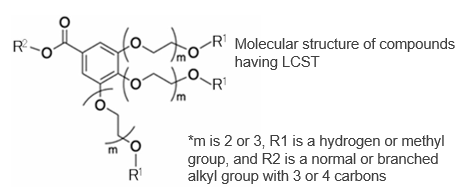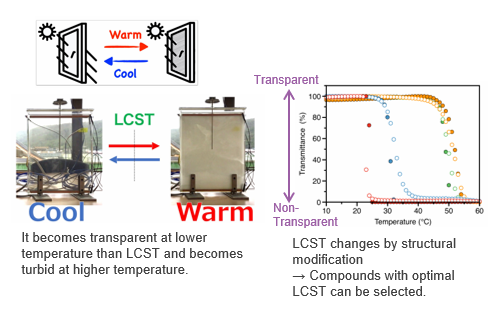Small Molecules Repeatedly Dissolved and Turbid in Water in Response to Ambient Temperature
Expected application to temperature-responsive smart windows
Overview
There are known compounds that exhibit phase separation when solutes dissolved in solvents exceed a certain temperature (LCST). Poly (N-isopropylacrylamide) (PNIPAm) has been studied as a representative of these compounds, and applications to temperature-responsive smart windows have been reported. However, since the LCST of PNIPAm is constant at 31°C, a compound that can flexibly respond to the LCST depending on ambient temperature has been desired in industry.
The inventors succeeded in synthesizing a new compound. This compound is characterized by the ability to control the LCST within the range of about 25~55°C by modifying a part of its structure. When applying to smart windows, most of them require a power supply because they switch between transmission and non-transmission by turning the voltage on and off. On the other hand, smart windows using this compound can be used in places without a power supply because they switch between transmission and non-transmission spontaneously according to changes in the outside temperature. Furthermore, by controlling the heat according to the degree of light transmission, it is expected to be effective against heat.

Features・Outstandings

Product Application
・Temperature responsive smart window
・Temperature responsive film
・Material to visualize temperature changes
・Surfactant
Related Works
IP Data
IP No. : JP2025-27996
Inventor : MAWATARI Yasuteru, SAITO Shunsuke
keyword : smart windows, LCST, cloud point, temperature responsive film, phase separation, thermochromic
